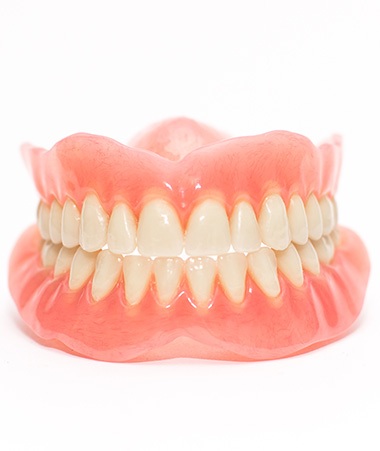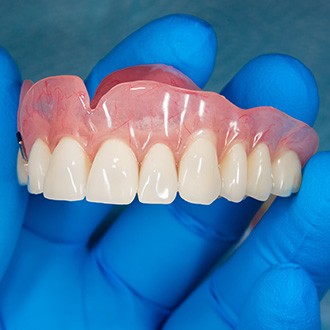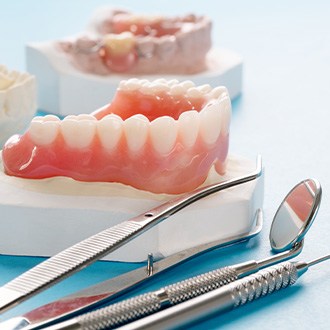Dentures – Morristown, NJ
Get a Smile You Can Take Pride In!

When you lose your teeth, you miss out on more than just eating. A smile that’s full of holes can sap your confidence, and it can be a serious detriment to your social life. This means that replacing teeth that you’ve lost can do just the opposite—boost your self-esteem and give you a brand-new lease on life!
If you’re here in New Jersey, the team here at Skyline Dental of Morristown can use dentures to give you a smile you can take pride in. Call us today for a consultation and we’ll tell you more about what this treatment can do for you.
Why Choose Skyline Dental of Morristown for Dentures?
- Beautiful Prosthetics Customized Perfectly to You
- Flexible Hours to Fit Your Schedule
- In-Network with a Variety of Insurance Carriers
Who Is a Good Candidate for Dentures?

If you’re missing several of your teeth, you’re probably well aware of the ways that this can hold you back. You won’t be able to eat all of the foods you want, in addition to the difficulty speaking and smiling that comes with tooth loss.
Dentures are a quick and easy way to replace many of the teeth on the gum ridge. These prosthetics are typically useful for patients who are missing most or all of their teeth; if you’ve lost only a few, another treatment may be better.
It’s also necessary that your gums be in good condition before you get dentures, so you should talk to your dentist about whether you’re in good enough health for your new teeth.
Types of Dentures

There are several different types of dentures, each of which meets various needs that a patient can have. We’ll be able to tell you more when we meet you in person about which is right for you, but here’s what you should know about them in the meantime.
Partial Dentures
Partial dentures consist of false acrylic teeth attached to a metal base, giving them the structure necessary to replace several non-consecutive teeth in the mouth. Partial dentures are designed for patients missing most but not all of their teeth, and they are designed to clip onto the existing teeth for support.
Full Dentures
Full dentures are made entirely from acrylic, and are meant for patients who need to replace all of the teeth on a gum ridge. They are meticulously fitted to your gums so that they can adhere entirely via suction.
Implant Dentures
If you’re interested in a little bit more stability, you can ask us about attaching your dentures to dental implants. This will provide your prosthetic with additional longevity, as well as allowing you to clean them without taking them off. This makes them a great option for patients who are dissatisfied with their traditional dentures.
How Dentures are Made

Many patients are surprised to learn that it can potentially take weeks to be fitted with dentures unless you opt for All-on-4 teeth in a day. The traditional method involves sending your information to a dental laboratory, which uses it to carefully customize your prosthetics at each step of creation. Understanding more about the process can help you appreciate your restored smile that much more.
Continue reading to learn more about how dentures are made, and feel free to reach out with additional questions.
What are Dentures Made Of?

Your new teeth consist of two main sections: the base and the artificial teeth, or pontics. A more detailed description of each is outlined below:
- Denture base. This structure provides the foundational shape for your new smile. It can be made from several different materials, such as nylon, resin, porcelain, or metal. A full set usually utilizes acrylic because it can be customized to look just like your gums. Partial dentures often also include metallic clasps that anchor them in place.
- The teeth themselves are usually made from composite resin or durable porcelain because both materials can be color-matched to your natural shade. However, porcelain is the standard selection because it’s incredibly resilient and looks more lifelike.
The Denture Creation Process

Designing and building your prosthetics requires careful attention to detail at every stage. Unless you’re receiving implant dentures, you can typically expect the step-by-step process to include:
- Step 1: Henkin will take scans for digital impressions of your upper and lower arches. These are loaded into special software that uses them to design a virtual model of your mouth that’s used to create your new teeth.
- Step 2: Your images and information are sent to a dental laboratory where a model of your mouth will be constructed with a 3D printer. Then, a technician begins placing a wax version of your gums.
- Step 3: Artificial teeth printed from durable porcelain are set into place, then the wax is carved and shaped to look like your gums.
- Step 4: The wax version is sent back to us so we can schedule a fitting. If everything checks out, we’ll send them back to be finalized.
- Step 5: At the lab, the teeth are placed into a flask that is then filled with plaster. Next, the flask is placed into hot water to melt away the wax portions.
- Step 6: Holes are made in the pontics so that they will attach to the new material, and then acrylic is injected into the flask to replace the wax.
- Step 7: The plaster is carefully removed to reveal your dentures, which are then placed in an ultrasonic bath to ensure no debris is left behind.
- Step 8: Any excess acrylic is trimmed away and your new teeth are polished to a shine.
- Step 9: The finished restoration is sent back to our office so we can schedule your final fitting.
<Learn More About Implant Dentures>
Adjusting to Your New Dentures

Once your dentures are in place, it’s natural to feel excited and want to resume your regular diet and activities right away. However, it can take about a month for your gums, tongue, and other supporting muscles in your mouth to acclimate to wearing and working around them. It’s normal to feel sore and sensitive until you’ve fully adjusted.
In the meantime, you can ease your transition by sticking to soft foods for a little while that won’t trigger any aches or inflammation. If you’ve developed a lisp or other changes to your speaking patterns, you can practice challenging words and sounds slowly at home until you feel more confident.
The Benefits of Dentures

Dentures have been used for decades to replace a few missing teeth or an entire arch. So, if you’re in need of a brand new smile, give us a call – we’d be happy to see you for a consultation! In the meantime, you can read on to learn a few of the many reasons this tooth-replacement solution continues to be so popular.
Improved Confidence

Patients are often worried that their dentures will be bulky or obvious, drawing unwanted attention to their smiles in the process. Don’t worry – these restorations have benefited greatly from advancements in both technology and dentistry. When you receive a prosthetic from us, it will be meticulously crafted to fit your smile, taking into account your face shape, your dental needs, your smile goals, and more. As a result, you can expect your dentures to look and feel just like natural teeth.
Varied Diet

One of the many downsides of tooth loss is that it takes a serious toll on your bite. As a result, even patients who are only missing two or three teeth are often left with one option: to stick to a diet consisting of only soft foods. Fortunately, dentures don’t just look great; they are crafted from durable, high-quality materials too! So, they’ll be strong enough to allow you to eat a much better diet.
Easy Dental Care

In short, dentures are easy to clean and maintain! The first step is using a soft-bristled toothbrush and dentist-recommended toothpaste to clean them each morning and evening. The second step is placing them in a clean container filled with denture cleaner at night. Of course, it’s also of the utmost importance that you take good care of your teeth and gums. That starts with flossing consistently and extends to visiting our Morristown dental team every six months for a dental checkup and cleaning as well.
Clearer Enunciation

Unfortunately, many patients end up becoming shy and reserved following tooth loss because it’s difficult to enunciate clearly. There is some good news: dentures can seamlessly fill the gaps in your smile or replace an entire arch of teeth! So, it won’t be long until you look and feel like yourself again.
Cost-Effective

Another noteworthy perk: dentures are one of the most cost-effective tooth-replacement options! Not only can they replace a large number of missing teeth simultaneously, but they also are usually covered partly by dental insurance providers. Even if you don’t have dental insurance, you can make the cost more affordable with flexible financing. In short, dentures can fit into nearly every budget, so don’t hesitate to ask us about the financial solutions available at your consultation.
Preserves Oral Health

Last, but certainly not least, dentures help prevent common oral health issues following tooth loss. That’s why Dr. Henkin and the rest of our Morristown dental team strongly recommend exploring your tooth-replacement options, even if the gaps in your smile don’t bother you. Our goal is to give you a smile that’s healthy, beautiful, complete, and functional, positively impacting your quality of life in the process.
Understanding the Cost of Dentures

As you consider whether to get dentures, you’ll also look into their price. That’s only natural – you must ensure treatment stays within your budget. Still, please note that the cost of dentures varies from patient to patient; you should consult Dr. Henkin for a precise estimate. Our dental team will also work tirelessly to make care more affordable for you. In particular, we’ll walk you through your treatment’s cost factors, payment options, etc. Just keep reading or call us to learn more.
Factors That Affect the Cost of Dentures

We’ll give you a quick (but thorough) oral exam as part of your consultation. Through this step, we can (among other things) review factors that affect your dentures’ cost. These elements include:
- Preparatory Services – In some cases, a patient needs specific dental work before they can get dentures. The required procedures can include tooth removal, gum disease therapy, or even bone grafts. If needed, these “extras” will add to your final expense.
- Material for Denture Base – A denture’s base can actually be made from many kinds of acrylic. Depending on the type used, your final restorations may be costly or inexpensive.
- Replacement Teeth Materials – To make a denture’s artificial teeth, labs either use acrylic or porcelain. The acrylic kinds don’t cost as much, but their results are short-lived. Porcelain teeth can be expensive but prove long-lasting.
Besides the points above, remember that the dentures with the lowest prices aren’t often the best. These sorts tend to use sub-par acrylic and other poor materials for their bases, teeth, etc. Given that fact, you should opt for high-quality dentures.
Are Implant Dentures More Expensive?

Since implant dentures have a higher upfront price than regular ones, they may not seem cost-effective at first. However, these implant-based models have perks that justify the expense.
You see, implant dentures have dental implants – metal posts placed in your jaw’s sockets. These posts fuse with your jawbone, so prosthetics attached to them are highly secure and don’t move around. An average implant denture is thus permanent and won’t slip or fall from your mouth. On the contrary, it’ll allow your new teeth to blend seamlessly with the rest of your mouth.
There’s also the fact that an implant denture is a wise long-term investment. This device’s implants can last over 30 years (with proper care), so the treatment’s results tend to last longer than other restorations. That means an implant denture won’t need as many repair or replacement visits, which would just eat up your funds. It’ll save you money otherwise spent on follow-up care.
Does Dental Insurance Cover Dentures?

Dental insurance usually does cover dentures, as most plans see the restorations as necessary. In fact, many plan providers will cover up to 50% of a denture’s cost.
All that said, you can encounter exceptions. There’s a chance that your plan has limited denture coverage or none. So, please confirm your benefits before treatment; we’ll even help you do so.
Other Options for Making Dentures Affordable

Please don’t panic if you don’t have insurance; dentures can be affordable without it! Instead, you should give serious thought to our helpful payment options. The right one would make otherwise pricey dentures much more budget-friendly.
In particular, you may want to try our dental financing service. This option lets you work with CareCredit – a 3rd party financier – to pay for care in monthly installments. That way, you can gradually cover the cost of dentures.
In the end, dentures from Skyline Dental don’t have to “break the bank.” Just learn how to finance them by attending a consultation.
Denture FAQs
Can I Sleep with My Dentures In?
Dentures, particularly full dentures, but a lot of pressure on the gums on a day-to-day basis. Eventually you’ll need to give your gums a rest so that they can breathe a bit, and the time while you’re sleeping is ideal for that. Moreover, dentures can also be allowed to soak in a denture cleaning solution overnight, keeping them hygienic. This prevents the buildup of bacteria, holding gum disease at bay and helping your dentures smell fresh.
For these reasons, most dentists strongly recommend taking out your prosthetic each night, leaving them to soak while you sleep.
Is It Hard to Talk with Dentures?
Talking is mostly muscle memory, which means that most major changes in your mouth will cause a little bit of problem with speaking at first. The exact amount of time it’ll take for speaking with your dentures to feel “normal” can vary from person to person, but there are things that you can do to expedite this process.
First, you should make it a habit to speak slowly, as this will make it easier to enunciate. You might also want to set aside time to practice speaking aloud, or to converse with someone you trust until you can speak with ease.
If you find that your dentures are often becoming dislodged while you speak, talk to us and we’ll see if your dentures are fitted to your gums in the way that they ought to be.
What Can’t You Eat with Dentures?
Dentures are capable of expanding the number of foods you’re able to eat when compared to toothlessness. However, given that your prosthetic is held in place via either small metal clips or suction, there are some foods that you might want to avoid in an effort to keep them in place:
- Sticky foods, like peanut butter and gummy candies
- Foods that can split into small pieces that can get underneath a prosthetic
- Hard foods that are difficult to chew up
- Tough meats that are tough to chew
- Popcorn kernels and shelled nuts
Why Do My Dentures Smell?
Dentures typically only start to smell due to the accumulation of foodstuffs and bacteria, as well as gum disease that comes from improper oral hygiene. This is compounded by the fact that people who wear dentures typically produce much less saliva, which is ordinarily responsible for keeping the mouth hygienic.
If you want your prosthetic to stay smelling nice, it’s important that you clean it as thoroughly as possible. Rinse them after meals, brush them twice a day, and leave them to rinse overnight in a denture cleaning solution. You should also brush your gums and the soft tissues in your mouth to keep them clear of any bacterial buildup.
